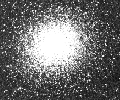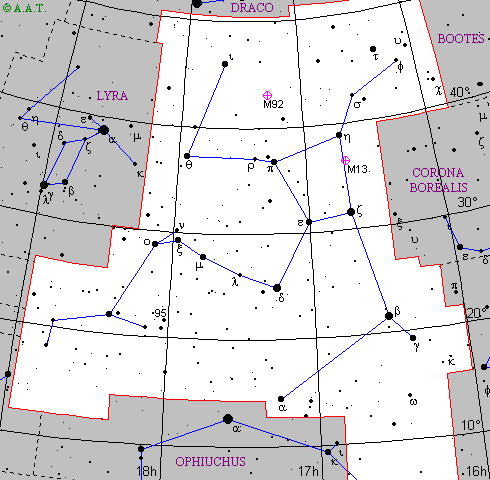| Description | Big constellation, fifth in order of dimensions: it is to the north of Ophiuchus, between Lyra and Bootes. The most characteristic and recognizable shape of the constellation is the quadrilateral formed by epsilon, zeta, eta and pi Herculis. In spite of its extension, Hercules doesn't contain any particularly bright stars, but it is rich in double stars. First of all Ras Algethi ("head of the kneeling", in Arab), composed by a red giant accompanied by a green-blue star of fifth magnitude; then delta, kappa and rho Herculis, all separable with modest instruments; not to lose, finally, 95 Herculis, a couple of stars of fifth magnitude that with small telescopes seem golden and silvery.  Between eta and zeta Herculis, near Corona Borealis, there is the great globular cluster M13, a group of more than 300.000 stars assembled in a sphere with a diameter of about 100 light-years. It is the brightest cluster of the northern sky and it is visible to the naked eye as an out-of-focus spot of sixth magnitude; it is about 22.500 light-years away from us. Between eta and zeta Herculis, near Corona Borealis, there is the great globular cluster M13, a group of more than 300.000 stars assembled in a sphere with a diameter of about 100 light-years. It is the brightest cluster of the northern sky and it is visible to the naked eye as an out-of-focus spot of sixth magnitude; it is about 22.500 light-years away from us.
There is then a second globular cluster, M92, well visible to binoculars: the central stars of M92 are more accumulated than those of M13. This cluster is 25.000 light-years away from us.
|
|---|
Mythology
and history | Hercules was son of Zeus and Alcmena, the most beautiful and wise of the mortal women; Zeus' wife, Hera, furious for her husband's unfaithfulness, tried in all the ways to take revenge. When Hercules had grown up, Hera provoked him an access of folly, during which he killed his children. Found again the power of reasoning and oppressed by remorse, he consulted the Delo's oracle to find comfort: the oracle ordered him to place himself at Euristeus' disposal for twelve years. Euristeus, who was king of Mycenae, wanted Hercules to performe ten exploits, known as Labours of Hercules:
- The Nemean lion (see the mythology of Leo).
- The hydra of Lerna (see the mythology of Hydra).
- The Cerinean hind. This hind had bronze clogs and gold horns and was sacred to Artemis, the goddess of hunting: Hercules pursued it for one year and finally captured it with a net while it was sleeping.
- The Herimantian wild boar. Hercules drove out the animal from the dense wood where it lived and he pushed it in a gorge where snow was high: when the wild boar was imprisoned in the snow, the hero succeeded in capturing it alive.
- Augia's stalls. Augia, king of Elis, had got a big number of flocks and herds: Euristeus ordered Hercules to clean the enormous stalls and to complete the job in only one day. Hercules opened two breaches in the boundaries of the stalls and diverted the course of the near river, so that its waters swept away the whole dirt. Completed the exploit, Hercules asked Augia a reward, but the king refused.
- The Stimphal birds. These animals had bronze beaks and claws and they devoured all the men who passed near their abode, the Stimphal swamp. Thanks to a harness-bell which the goddess Athena gave him, Hercules frightened the birds making them raise in flight and killed them.
- The Cretan bull. It was the bull father of Minotaurus (see also the mythology of Corona Borealis): Hercules captured it without big problems.
- Diomedes' mares. Diomedes, king of the warlike Bistons, possessed four wild mares, which devoured human meat: Hercules captured them and embarked them on his ship. Pursued and attached by the Bistons, the hero fight against them, he captured the king Diomedes and threw him to the mares, which from that moment were tamed.
- Hyppolita's belt. The Horsewomen's queen, Hyppolita, had got a golden belt: despite Hera's intervention, who tried to instigate the Horsewomen against Hercules, the hero succeeded in taking the belt.
- Jerion's livestock. Jerion was an ogre with three heads, six arms and three busts, who lived on the shores of the Ocean Sea. Hercules crossed Libya, he reached the straits which today are called Gibraltar (where he erected the columns that took the name from him), he stole the livestock and killed Jerion with only one arrow, which pierced all the three bodies going in by a side.
- Hesperides' apples. (Even though he had completed ten exploits, nevertheless Euristeus did not recognize nor the second one, because Hercules was helped, neither the fifth one, because the hero tried to get some profit: therefore he imposed two other labours.) Arrived at the gold apples garden, Hercules, after having killed the snake Ladon (then placed in sky in the constellation of Draco), asked Atlas, the titan who held up the vault of heaven to go and take the marvelous apples. Atlas accepted and took the apples, but when he came back he refused to retake the sky on his shoulders: Hercules pretended to resign, but he begged him to sustain the load for a short time so that he could settle better; Atlas fell in the deception and Hercules, picked up the fruits, happily returned to Greece.
- The capture of Cerberus. Hercules went down in the hereafter, he defeated Hades himself, god of the dead, and he captured the monstrous infernal dog with three heads.
Finished his labours, Hercules married the beautiful Deianira. One day the centaur Nessus fell in love with the young girl and he tried to rape her: Hercules saw him and struck him with one of the arrows dipped in the hydra's poison. The dying centaur make Deianira to believe that his blood was a love-potion and he invited her to take a little of that and to put it aside. When the woman had the suspicion that Hercules betrayed her, she wet a tunic with Nessus' blood, hoping to win her husband's love again: when Hercules worn the poisoned garment, his meats began burning. Deranged by the pain, the hero prepared a pyre and climbed it putting an end to his earthly life. Zeus welcomed him on the Olympus - where Hercules and Hera became reconciled - and gave him a place among the constellations. |
|---|


 Back to constellations page.
Back to constellations page.